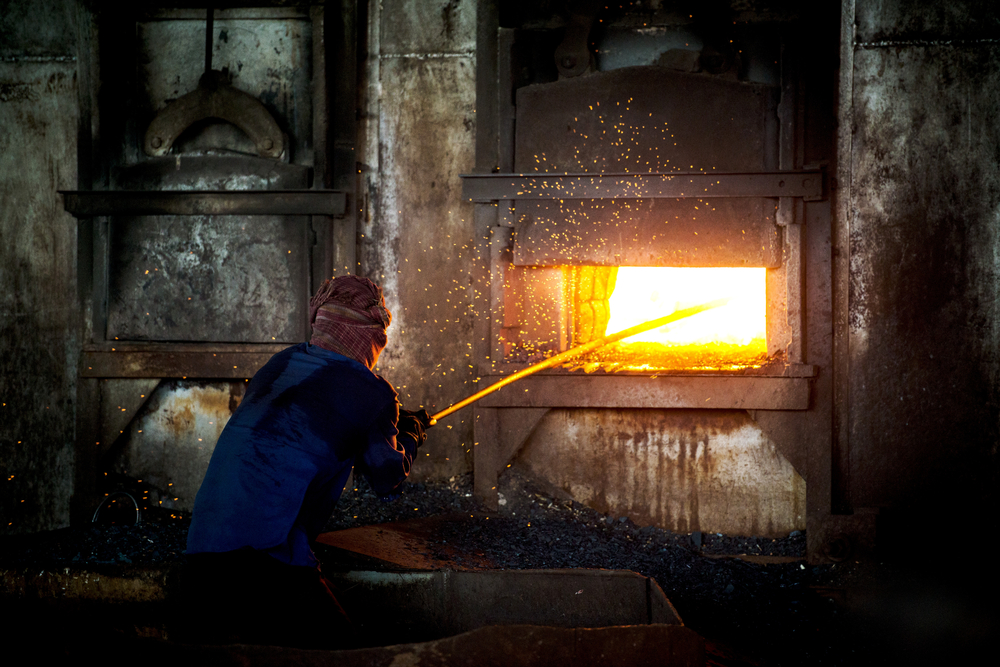Industrial output contracted tanked 16.7 per cent in March, a month marked by the nationwide lockdown in the last week.
Manufacturing slumped 20.6 per cent in the month, but worse still was capital goods, which fell 35.6 percent and consumer durables, which shrank 33.1 per cent.
The sharp decline in the index of industrial production (IIP) in March followed a seven-month high growth of 4.5 per cent in February. IIP had grown 2.7 per cent in March, 2019.
Prime Minister Narendra Modi had first announced the lockdown on March 24 at 8pm that took effect within four hours.
According to National Statistical Office (NSO) data, manufacturing sector output fell 20.6 per cent compared with a growth of 3.1 per cent in the same month a year ago. Electricity generation declined 6.8 per cent against a growth of 2.2 per cent in March 2019. Mining sector output remained flat compared with a growth of 0.8 per cent earlier.
The NSO, however, released the data with the caveat that information flow from producing units was impacted because of the lockdown. As a consequence of the lower response rate, the quick estimates released are likely to undergo revision.
Aditi Nayar, principal economist, Icra said “as expected, the deep contraction in manufacturing pulled down the industrial performance to a year-on-year decline of 16.7 per cent in March 2020, a clear glimpse into the post-lockdown landscape, with the situation only set to get decidedly gloomier in April 2020”.
“Unsurprisingly, the extent of contraction is the most severe in March 2020 in the case of capital goods and consumer durables, highlighting the pause in investment intentions and deferral of non-essential consumption. Even consumer non-durables, which includes several essential items, witnessed a 16.2 per cent contraction in output in March 2020, as the lockdown interrupted production in several factories,” she added.
Industrial output, as classified by the end-use of goods, also showed a contraction .
Capital goods output contracted 35.6 per cent in March against a contraction of 9.7 percent in the previous month.
Contraction in consumer durables was 33.1 percent compared with a fall of 6.4 from February.
Consumer non-durables output contracted 16.2 percent after showing no growth in February. Infrastructure and construction goods output contracted 23.8 percent compared with a 0.1 per cent raise in February, the data showed.
Primary goods output contracted 3.1 per cent in March compared with growth of 7.4 per cent in February.
The IIP in the last fiscal contracted by 0.7 per cent from 3.8 per cent expansion in the 2018-19.
Madan Sabnavis, chief economist, Care ratings, said: “For the full year growth was negative at -0.7 per cent. For the year, metal products registered impressive growth with positive growth in apparel and food products. Otherwise it was quite lacklustre. The picture for April would be worse with virtual nil growth in most sectors which will mean a very large dip in growth rate in manufacturing. Only some segments like food and pharma show positive growth.”
After hitting an 11-month high in February, the eight infrastructure sectors shrank 6.5 per cent in March. Earlier, the IHS Markit India Manufacturing Purchasing Managers’ Index fell to 27.4 last month from March’s 51.8, by far its lowest since the survey began in March 2005. It is the first time it has gone below the 50-mark separating growth from contraction in nearly three years.
“After making it through March relatively unscathed, the Indian manufacturing sector felt the full force of the coronavirus pandemic in April,” IHS Markit said.










